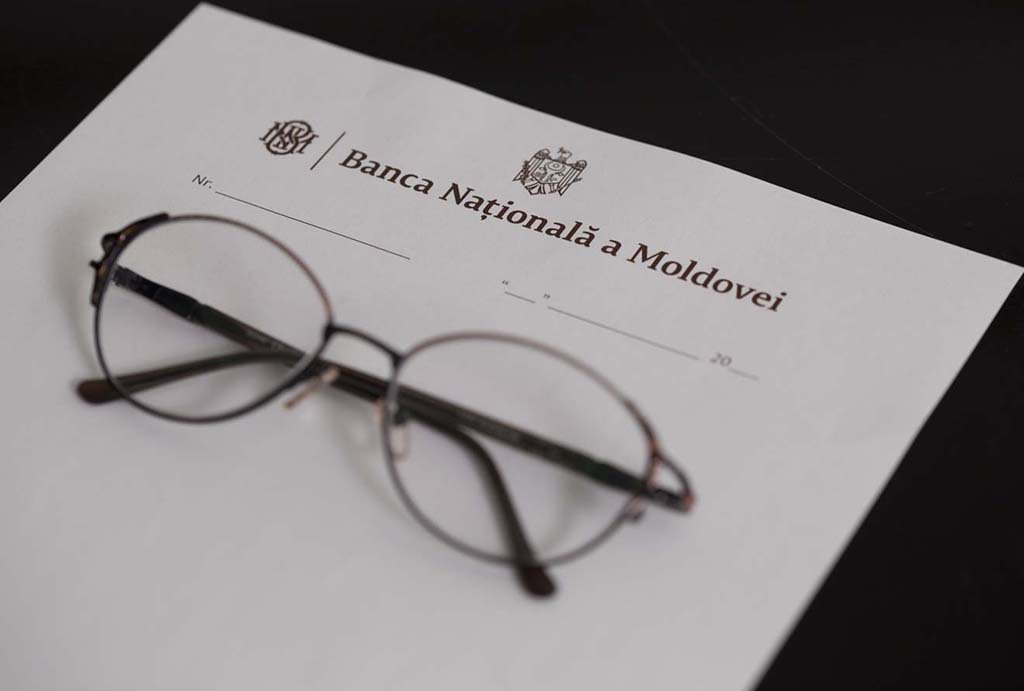Welcome to the official website of the National Bank of Moldova!
×
Do you have good eyesight and want to turn this tool off?
Do you have good eyesight and want to turn this tool off?
Schedule of reception of citizens by the Executive Board of the National Bank of Moldova.
The registration of applicants for an audience is carried out based on a written request on the subject addressed.
Anca Dragu, Governor
1st Wednesday of the month: 14.00-16.00.
Petru Rotaru, First Deputy Governor
2nd Wednesday of the month: 14.00-16.00.
Tatiana Ivanicichina, Deputy Governor
3rd Wednesday of the month: 14.00-16.00.
Constantin Șchendra, Deputy Governor
4th Wednesday of the month: 14.00-16.00.
Mihnea Constantinescu, Deputy Governor
5th Wednesday of the month: 14.00-16.00.
Welcome to the official website of the National Bank of Moldova!
If you want to send a message (question or suggestion) on-line, go to section "Feedback" from the main menu at the top of the website.
You can choose one of the most popular reports from the list:

National Bank and the members of its decision-making bodies shall be independent in exercising the tasks conferred upon them by law, and shall neither seek nor take instructions from public authorities or from any other authority.

In order to ensure and maintain price stability over the medium term, the National Bank’s aim will be to keep inflation (measured by Consumer Price Index) at the level of 5.0 percent annually with a possible deviation of ± 1.5 percentage points, considered to be optimal for growth and development of Moldova's economy over the medium-term.

Financial stability is achieved by strengthening the resilience of the financial system, limiting the contagion effect and reducing the accumulation of systemic risks, thus contributing to the sustainability of the financial sector and economic growth.

National Bank shall have the exclusive right to issue on the territory of the Republic of Moldova banknotes and coins as legal tender, as well as commemorative and jubilee banknotes and coins as legal tender and for numismatic purposes.

National Bank is exclusively responsible for the licencing, supervision and regulation of financial institutions activity.

National Bank of Moldova acts as banker and fiscal agent of the State and shall receive from state bodies economic and financial information and documents, which are necessary for carrying out its tasks.

National Bank of Moldova is an autonomous public legal entity and is responsible to the Parliament.

National Bank shall inform the public on the monetary policy strategy on the results of the macroeconomic analysis, the evolution of the financial market and on statistics, including with regard to monetary supply, crediting, balance of payments and the state of the foreign exchange market.

National Bank of Moldova is responsable for the compilation of the balance of payments, international investment position and the statistics of the external debt of the Republic of Moldova.
The website www.bnm.md prioritizes data security and uses cookies to enhance the browsing experience and user comfort. Accepting the use of cookies contributes to faster page loading and ensures the proper functioning of the information presentation modules. Refusing to use cookies may slow down the site’s loading speed and hinder smooth navigation between pages. For more details, please refer to the Cookie Usage Policy.
Configure your cookie preferences by category. Strictly necessary cookies cannot be disabled, as they are essential for the proper functioning of the website.
These cookies are fundamental to the correct operation of the website. They include session cookies used for load balancing and maintaining the application's state.
Cookies: cookiesession1, JSESSIONID
These cookies enable personalized features, such as font size preferences, interface state, and selection of desktop/mobile version.
Cookies: has_js, fontCookie, statistics_time, statistics_tooltip, bnm_coins_expansion, desktop_version
Such cookies help us understand how visitors interact with our site by collecting and reporting information anonymously.
Cookies: _ga, _gid, _gat, node_stat
These cookies store accessibility preferences, such as text size, contrast, cursor size, and animation settings.
Cookies: a11y_oversized_widget, a11y_animation, a11y_invert, a11y_contrast, a11y_dyslexic, a11y_cursor, a11y_factor
The National Bank of Moldova (NBM) expresses its deep concern over the house searches proceedings and the way of conducting of the criminal investigation against some key function employees, under the pretext of misuse of their rights granted under the Law on banking activity, the allegedly abusive interpretation of factual and legal situations, which served as the basis for an allegedly abusive issuance of a decision of the NBM Executive Board on the concerted action of some shareholders and the failure to obtain the NBM prior permission to hold qualified shares in the share capital of a bank.
The investigation refers to a decision of the NBM taken in accordance with the commitments assumed by the Republic of Moldova in the Memorandum with the IMF, in the context of the extensive process of reforming the banking system, carried out in the last almost four years by the National Bank, in order to ensure shareholders’ transparency, a sound corporate governance in banks and a regulatory framework needed to establish a stable banking sector.
The NBM exercises a complex mandate aimed at protecting the public interest. The supervisory measures are based on qualitative assessments and professional judgment of a particularly complex nature done by the NBM employees, susceptible of divergent interpretations by the persons who are subjects of the supervisory act, as well as by third parties and authorities. The high financial interests that may be affected by the measures adopted by the NBM, on the one hand, and the complexity of the professional reasoning applied by the NBM staff, on the other hand, increase significantly the litigious risks to which the NBM and its employees are exposed.
According to the law, the NBM is the single and only authority entitled to formulate judgements on considerations of appropriateness, assessments and qualitative analyses that constitute the basis for issuing its acts regarding the application of sanctions, sanctionary measures and other measures.
Thus, the judicial and pre-judicial proceedings of any nature, regardless of the final solution, directed against the NBM and /or its employees have a strong deterrent effect on the NBM and intimidate its employees in exercising in good faith their functional tasks of risks assessment, thus compromising the NBM ability to exercise its powers objectively and independently in order to achieve the public interest objectives.
In this context, given that the NBM decision is in force and benefits from the presumption of legality, and the institution and its employees have fully cooperated with the criminal investigation authorities, the actions of the latter ones could be perceived as an infringement in the exclusive competence of the NBM to evaluate and supervise the banking shareholders, which is inadmissible even from the perspective of the separation of powers in a state governed by the rule of law. Such actions prevent the staff of a central bank from carrying out its duties properly and reduce the institution's ability to ensure the supervision, transparency and stability of the banking sector.
The Executive Board of the National Bank of Moldova
1 Grigore Vieru Avenue,
MD-2005, Chisinau, Republic of Moldova.
© National Bank of Moldova
Terms of use
Cookie Usage Policy




